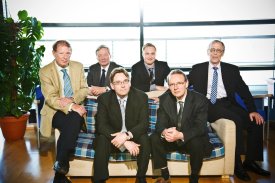Jan 17 2011
Picosun Oy, Finland-based global manufacturer of state-of-the-art Atomic Layer Deposition (ALD) systems, takes part in EPAMO, a major 13.3 million euro project aiming at reducing up to 1,700 Megawatts (MW) from the global energy consumption of wireless communication systems, such as mobile phone technology.
Picosun is one of the eleven top-tier industrial and four leading research partners from Finland, Germany, the Netherlands, and Sweden forming the EPAMO partnership.
Endless increase in wireless traffic will congest global data transfer systems. Tomorrow there will be an increased number of frequency bands and advanced mobile phone standards supporting high data rates. According to estimates, the number of mobile phone base stations will grow from current five million to ten million by 2015 largely due to new communication infrastructure being built in the developing countries. This amount of base stations consumes some 15,000 Megawatts of power.
 Picosun Board of Directors: Professor Jorma Routti (left) - former Director General of EU Science Directorate, Professor Lauri Niinistö - recently awarded first ever GerALD prize, M.Sc Kustaa Poutiainen - Picosun Chairman and CEO, M.Sc Juhana Kostamo - Picosun Managing Director, Dr. Tuomo Suntola - inventor of ALD technology, and Mr. Sven Lindfors - Picosun CTO and world's most experienced designer of ALD systems.
Picosun Board of Directors: Professor Jorma Routti (left) - former Director General of EU Science Directorate, Professor Lauri Niinistö - recently awarded first ever GerALD prize, M.Sc Kustaa Poutiainen - Picosun Chairman and CEO, M.Sc Juhana Kostamo - Picosun Managing Director, Dr. Tuomo Suntola - inventor of ALD technology, and Mr. Sven Lindfors - Picosun CTO and world's most experienced designer of ALD systems.
New technology developed through EPAMO will cut some 1,500 MW of this consumption alone. EPAMO’s input into handset technology will add additional 140 MW of saved energy into the pool of tomorrow’s greener communication systems. 1,640 MW is more than the electric power capacity of the very latest giant nuclear plant type, still under construction in Finland and France. Generating that amount of energy through the use of fossil fuels would release 12.9 million metric tons of carbon dioxide (CO2) into the environment every year.
EPAMO is based on the intent to create a new MEMS (Microelectromechanical Systems) technology platform which enables an RF (Radio Frequency) front-end architecture for both today’s and next generation mobile communication systems including handsets and base stations. Developing a reconfigurable antenna concept will produce unrivalled performance, energy efficiency, degree of miniaturization and cost efficiency. This will be achieved by a holistic approach providing new advanced wafer materials and RF component designs, combining new thin film materials and thin film technologies with CMOS (Complementary Metal-Oxide-Semiconductor) solutions following a More than Moore Law approach (Moore’s Law focuses on transistor density; More than Moore Law refers to system integration and revolutionary megafunction electronics).
EPAMO is coordinated by Dr. Thomas Metzger of EPCOS AG of Germany. EPCOS is the world leader in RF filters and global number two on module solutions for the RF front-end of mobile phones. EPCOS Netherlands N.V. hosts the development and business development of several RF system solutions like antenna tuners, tunable power amplifiers and smart RF front-ends for EPCOS.
“Main goal for EPAMO is the global mobile phone cluster, but the same antenna tuner technology will also enter into mobile IT devices like PDA (Personal Digital Assistant) mobile mini laptops, tablet computers and other such devices to increase and optimize the data throughput. For EPAMO products this will open another market, similar in size to the mobile phone industry potential,” says Juhana Kostamo, Managing Director of Picosun.
Picosun will, as a part of EPAMO, develop advanced materials based on ALD and solve manufacturing process challenges concerning deposition of uniform and conformal thin films on substrates containing 3D structures and high aspect ratio TSVs (Through-Silicon Vias). “RF-MEMS become so miniscule in size and so complicated in structure that ALD offers the only feasible technology for RF-MEMS thin films. In view of this it is very fortunate that solving ALD related production challenges is the very area where Picosun has been leading the way lately,” Mr. Kostamo says.
ENIAC JU (European Technology Platform on Nanoelectronics Joint Undertaking), a public-private partnership between the European Commission, 21 European countries and various nanoelectronics actors funds 2.2 M€ of EPAMO budget. National public funding from the participating nations covers 5.5 M€, and 5.6 M€ comes from EPAMO partners.
Global MEMS market will grow to more than 12.5 billion US$ by 2012. Of this, almost 1.2 billion will be RF-MEMS. Whilst the overall MEMS market will grow with a CAGR (Compound Annual Growth Rate) of 17% from 2008 to 2012, RF-MEMS is expected to have a CAGR of 45%, the highest of all MEMS sectors.
Picosun Oy is a global manufacturer of state-of-the-art ALD systems for micro- and nanotechnology applications. Picosun represents continuity for over three decades of ALD reactor design and manufacturing in Finland. Picosun is based in Espoo, Finland and has its US headquarters in Detroit, Michigan. SUNALE™ ALD process tools are installed in various universities, research institutes and companies across four continents. Picosun Oy is a part of Stephen Industries Inc Oy.
Dr. Tuomo Suntola, inventor of ALD technology, is Member of the Board of Directors of Picosun. World’s most experienced ALD reactor designer Sven Lindfors is Picosun´s Chief Technology Officer and founder of the company. Picosun Oy is a part of Stephen Industries Inc Oy.